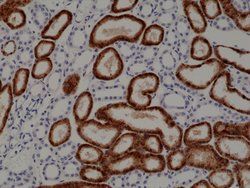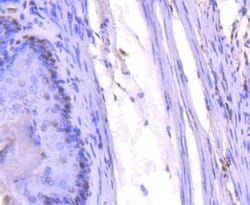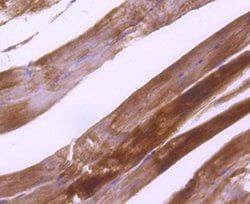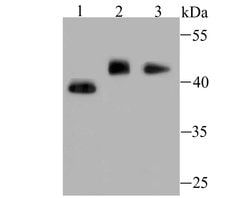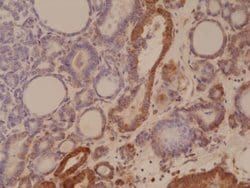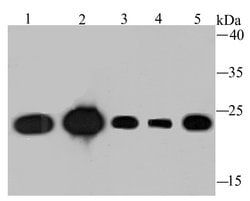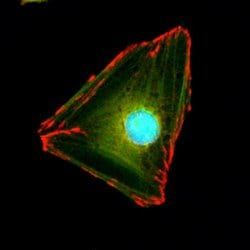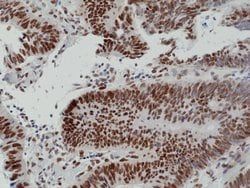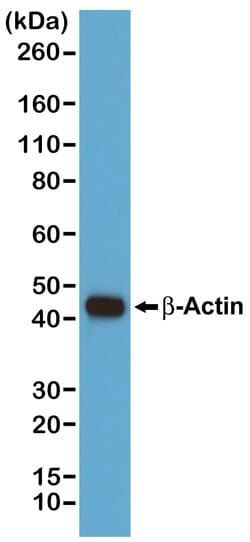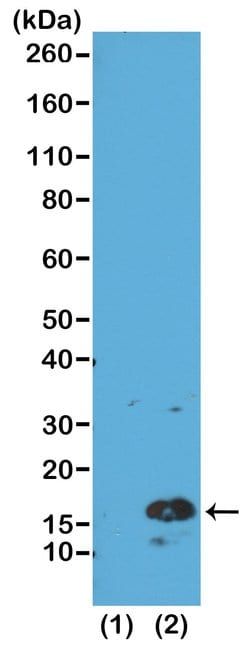Paxillin Recombinant Rabbit Monoclonal Antibody (RM256), Invitrogen™
Manufacturer: Thermo Scientific
Select a Size
| Pack Size | SKU | Availability | Price |
|---|---|---|---|
| Each of 1 | PIMA533075-Each-of-1 | In Stock | ₹ 46,947.50 |
PIMA533075 - Each of 1
In Stock
Quantity
1
Base Price: ₹ 46,947.50
GST (18%): ₹ 8,450.55
Total Price: ₹ 55,398.05
Antigen
Paxillin
Classification
Recombinant Monoclonal
Concentration
0.1 mg/mL
Formulation
PBS with 1% BSA, 50% glycerol and 0.09% sodium azide
Gene Accession No.
P49023
Gene Symbols
PXN
Immunogen
A peptide corresponding to the N-terminus of human Paxillin.
Quantity
100 μL
Primary or Secondary
Primary
Target Species
Human
Product Type
Antibody
Isotype
IgG
Applications
Immunocytochemistry, Immunohistochemistry, Western Blot
Clone
RM256
Conjugate
Unconjugated
Gene
PXN
Gene Alias
adaptor protein, AW108311, AW123232, FLJ16691, hCG_1778014, I79_001229, myocardial ischemic preconditioning associated protein 7, Pax, PAX-1, PAXI, Paxillin, paxillin a, paxillin alpha, pxn, pxna, testicular tissue protein Li 134, TGFB1I1, transforming growth factor beta 1 induced transcript 1, wu:fw71f12
Host Species
Rabbit
Purification Method
Protein A
Regulatory Status
RUO
Gene ID (Entrez)
5829
Content And Storage
-20°C
Form
Liquid
Description
- Specificity: reacts to human Paxillin
- Specificity: may also react to mouse or rat Paxillin, as predicted by immunogen homology
- Recombinant rabbit monoclonal antibodies are produced using in vitro expression systems
- The expression systems are developed by cloning in the specific antibody DNA sequences from immunoreactive rabbits
- Then, individual clones are screened to select the best candidates for production
- The advantages of using recombinant rabbit monoclonal antibodies include: better specificity and sensitivity, lot-to-lot consistency, animal origin-free formulations, and broader immunoreactivity to diverse targets due to larger rabbit immune repertoire
- Paxillin is a focal adhesion protein and a substrate for several tyrosine kinases such as src, FAK, and p210BRC/ABL
- The tyrosine phosphorylation of paxillin is affected by conditions that change cell-cell adhesion
- Paxillin associates tightly with FAK and Crk through its SH2 domain
- This interaction is independent of the extracellular matrix
- Although paxillin was initially discovered in fibroblasts, its phosphorylation may also be important during neurite extension during differentiation.

